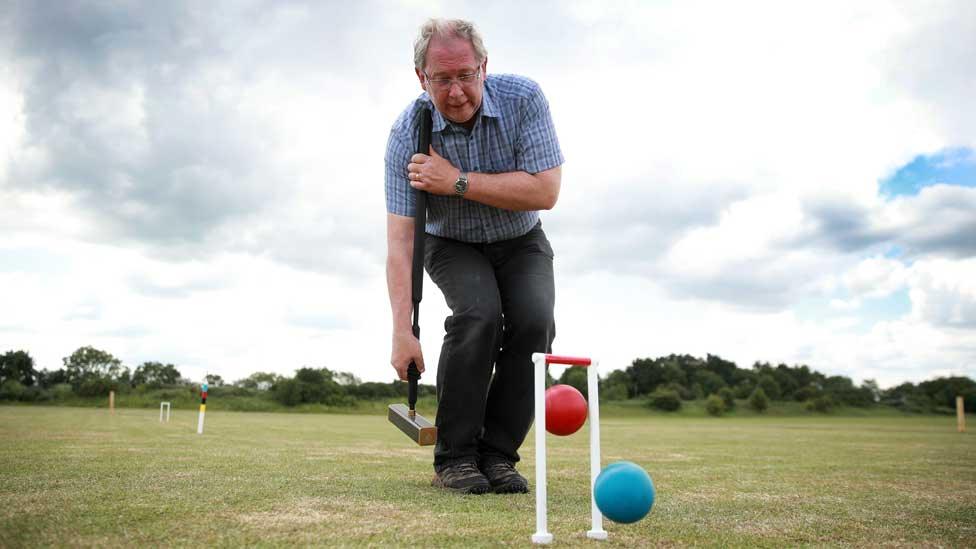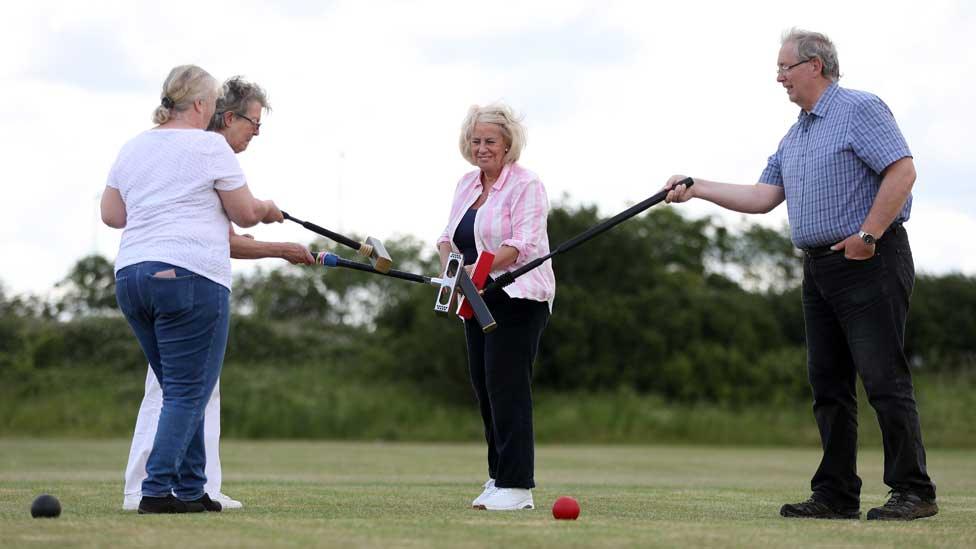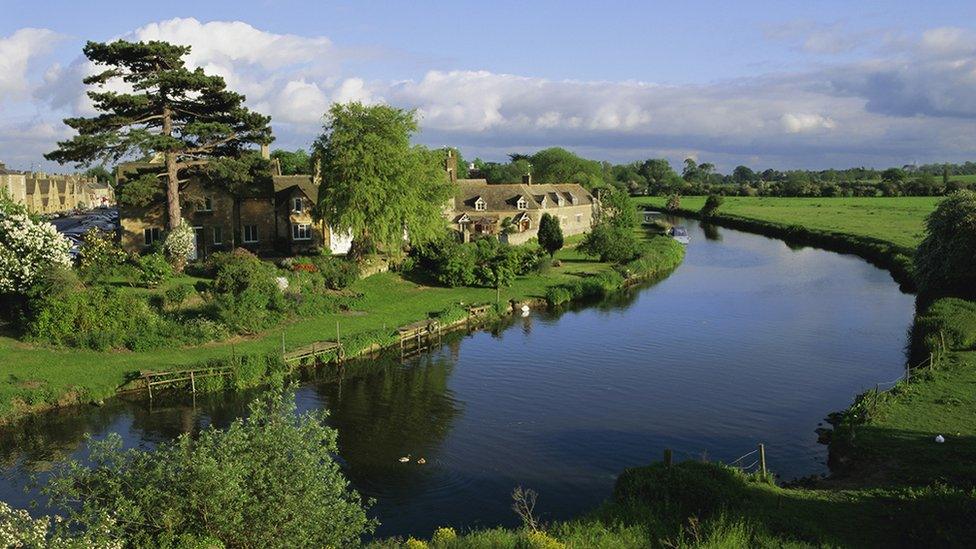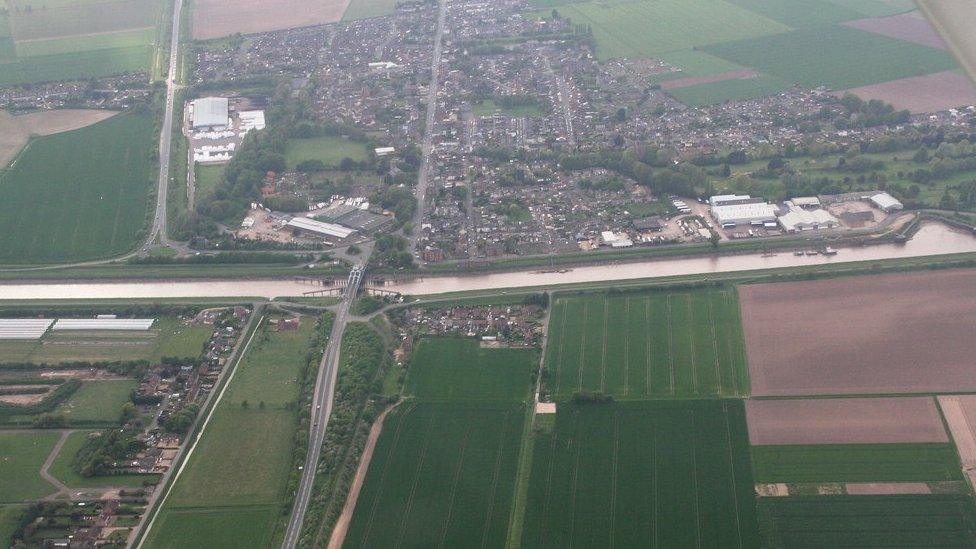River Nene: Croquet match decides river's pronunciation
- Published

Northampton club chairman, Paul Chard, said he wants more people to join so they can "retain the title of the River Nen for life"
A croquet match has been used in an attempt to settle a dispute between two counties over the pronunciation of a river name.
In Northamptonshire, the 90-mile (150km) River Nene is known as the "Nen". Over the Cambridgeshire border, it is pronounced "Neen".
Northampton and Peterborough croquet clubs battled it out on Sunday, with the winner deciding the pronunciation.
Northampton won 7-2 and so both clubs will now use the "Nen" pronunciation.
'Local rivalries'
Paul Chard, Northampton's club chairman, said it had been "a fantastic day" at Central Park in Peterborough.
"It's almost a bit panto-like, the number of people who are pleased that 'Nen' will be the pronunciation."
But it will not be the final word on the matter - the two clubs plan to compete again in 12 months' time.
"We need everyone to come down to the Northampton Croquet Club and join us so that we can retain the title of the River Nen for life," he said.

Northampton Croquet Club won 7-2 and so both clubs will use Nen in all official capacities
Peterborough club secretary, Paul Hetherington, said: "We were robbed really - 55% of the hoops scored were scored by us and, despite that, I've got to call it the 'Nen'.
"It's like having possession all through a football match and still running out losers. But, to be fair, Northampton were very worthy winners."
The river rises in Northamptonshire and then flows through Cambridgeshire, where it forms the border with Norfolk for a few miles, before reaching Lincolnshire and flowing into the sea at The Wash.

The River Nene flows through Wansford on its way to Peterborough
Generations have battled over the correct way to pronounce it.
Lead curator in spoken English at the British Library, Jonnie Robinson, said there would have been a form that was "historically older", an original sound which changes over time, with different spellings as well.
"I've heard more locals in Northamptonshire say 'Nen' even though the 'e' on the end suggests 'Neen'," he said.
"But there are very much local rivalries [with many pronunciations] and while it's difficult to prove one or another, they are things that people get very hot under the collar about.
"It's important because if it's your hometown or area, it's part of your identity, especially if you've moved away. It's an identifier of home."
Prof Richard Coates, from the Bristol Centre for Linguistics, said: "Nene with the longer 'ee' sound is probably the older name, and the one with the short 'e' is probably an innovation."
Jane Setter, professor of phonetics at Reading University, said the origins of the name may precede the Celtic/Bronze Age (2100BC to 750BC), but modern pronunciation was simply a matter of where you come from.
"It looks like there have been variant spellings until the mid-1800s, such as Nenn or Nyn," she said.
"I doubt very much that this croquet match has actually settled it."

The River Nene flows under the swing bridge at Sutton Bridge in Lincolnshire, on its last leg to The Wash
The Nene enters Lincolnshire near the village of Sutton Bridge.
Collette Thomas, the landlady's daughter at the village's Riverside Bar and Restaurant, said: "I'm from Cheshire, but in the 30 years I've lived in Lincolnshire and Norfolk I've never heard it pronounced any other way than 'Neen'," she said.
"In fact, it's the first time I've ever heard that 'Nen' pronunciation."

Find BBC News: East of England on Facebook, external, Instagram, external and Twitter, external. If you have a story suggestion email eastofenglandnews@bbc.co.uk, external